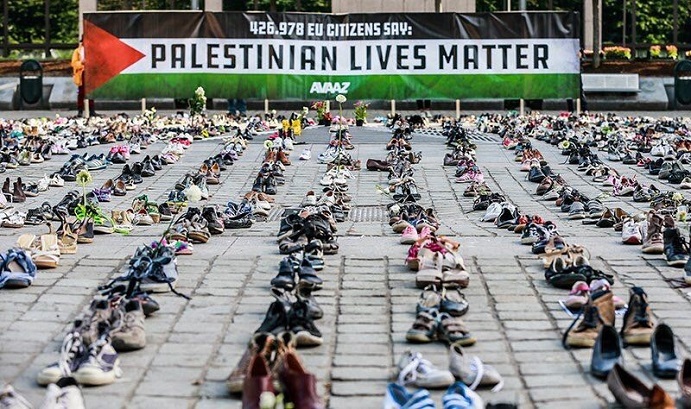
Middle East Monitor / February 4, 2020
The European Union has been criticised for caving-in to Israeli pressure following its adoption of a new funding criterion, which critics have warned is intended to criminalise Palestinian dissent. Fresh concerns were raised over terms added by the EU last year, which required Palestinian institutions to ensure that no beneficiaries of their projects or programmes are affiliated with groups listed as terrorist organisations by the bloc.
When the new criterion was introduced, the Palestinian Non-Governmental Organisations (PNGO) network rejected the terms in a letter signed by 134 Palestinian NGOs in the West Bank, Gaza Strip and Jerusalem two months ago. Although the EU defend its criterion, insisting that the new restrictions would not affect individuals and was aimed at political entities, the NGOs expressed concerns over the document’s ambiguity.
Palestinian institutions said that the new demands were not included in previous agreements with the EU, and that approving them would mean that they would be required to apply a political test on who was entitled to receive donor funds.
“The danger in agreeing to these terms lies in excluding the legitimate struggle of the Palestine people from its international legal framework and including it in the circle of terrorism,” said Muhsien Abu Ramadan, a leading Palestinian analyst, writer and former president of the PNGO network in the Gaza Strip.
Mustafa Barghouti, general secretary of the Palestinian National Initiative and a member of the Palestine Liberation Organisation, dismissed the new criterion: “Palestinian civil society institutions will not distinguish between one citizen and another because of their political opinions, race, religion or anything else.”
While the EU’s funding covers around 70 per cent of the projects in the Palestinian territories, it had not directly involved itself in any controversy over who receives the money. That task was left to accredited Palestinian NGOs.
This change in EU policy is believed to be a consequence of Israeli pressure, according to Al-Shabaka Policy Advisor Tariq Dana. “The latest EU move has been a result of constant Israeli pressure on the EU to refrain from funding many Palestinian organisations, especially those engaged in revealing and reporting on Israeli colonial practices, human rights violations and crimes,” explained Dana.
The assistant professor at the Centre for Conflict and Humanitarian Studies at the Doha Institute of Graduate Studies believes that the new criterion has to be situated in “the context of ongoing Israeli colonisation” and is a new mechanism for controlling Palestinian lives. Defunding Palestinians NGOs has become a key goal for Israel in its attempt to supress dissenting voices, Dana claimed. Legitimate organisations which use international law to report human rights violations, such as Al-Haq and Addameer, are thought to be at risk of having donations cut.
Others are also in danger, such as the Bisan Centre for Research and Development, an organisation which implements projects in Area C. According to Dana, the centre “supports the steadfastness of local communities suffering from the Israeli military and settlers.” The director of Bisan Centre, Ubai Aboudi, is thought to have been arrested by Israel recently and is being held with neither charge nor trial in administrative detention.





![vrijdag 17 mei in Amsterdam: in gesprek [videoverbinding] met Palestijnse arts Ghassan Abu-Sittah](https://palestina-komitee.nl/wp-content/uploads/2024/04/abu-Sittha-1-1-218x150.png)






